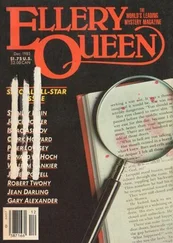Нэнси Пикард - Ellery Queen’s Mystery Magazine. Vol. 128, No. 6. Whole No. 784, December 2006
Здесь есть возможность читать онлайн «Нэнси Пикард - Ellery Queen’s Mystery Magazine. Vol. 128, No. 6. Whole No. 784, December 2006» весь текст электронной книги совершенно бесплатно (целиком полную версию без сокращений). В некоторых случаях можно слушать аудио, скачать через торрент в формате fb2 и присутствует краткое содержание. Город: New York, Год выпуска: 2006, ISBN: 2006, Издательство: Dell Magazines, Жанр: Детектив, на английском языке. Описание произведения, (предисловие) а так же отзывы посетителей доступны на портале библиотеки ЛибКат.
- Название:Ellery Queen’s Mystery Magazine. Vol. 128, No. 6. Whole No. 784, December 2006
- Автор:
- Издательство:Dell Magazines
- Жанр:
- Год:2006
- Город:New York
- ISBN:0013-6328
- Рейтинг книги:3 / 5. Голосов: 1
-
Избранное:Добавить в избранное
- Отзывы:
-
Ваша оценка:
- 60
- 1
- 2
- 3
- 4
- 5
Ellery Queen’s Mystery Magazine. Vol. 128, No. 6. Whole No. 784, December 2006: краткое содержание, описание и аннотация
Предлагаем к чтению аннотацию, описание, краткое содержание или предисловие (зависит от того, что написал сам автор книги «Ellery Queen’s Mystery Magazine. Vol. 128, No. 6. Whole No. 784, December 2006»). Если вы не нашли необходимую информацию о книге — напишите в комментариях, мы постараемся отыскать её.
Ellery Queen’s Mystery Magazine. Vol. 128, No. 6. Whole No. 784, December 2006 — читать онлайн бесплатно полную книгу (весь текст) целиком
Ниже представлен текст книги, разбитый по страницам. Система сохранения места последней прочитанной страницы, позволяет с удобством читать онлайн бесплатно книгу «Ellery Queen’s Mystery Magazine. Vol. 128, No. 6. Whole No. 784, December 2006», без необходимости каждый раз заново искать на чём Вы остановились. Поставьте закладку, и сможете в любой момент перейти на страницу, на которой закончили чтение.
Интервал:
Закладка:
She laughed. “I should say it was a woman’s intuition. The only priest who insisted on wearing his black suit and collar all the time was the one who wasn’t a priest at all. But there were a few facts, too. There were no fingerprints on that envelope containing the clergy retirement forms. That told me two things — that the forms were important enough for the killer to have wiped his prints off the envelope before abandoning it, and that they belonged to neither the dead man nor his roommate. Certainly Father Stillwell’s prints on an envelope in their drawer wouldn’t have been suspicious. No, the killer came on board to swindle the priests, posing as a priest himself. It was his bad luck to start with Father Ullman.”
“Why was that?” Lisa wondered.
“Because the fax Sid showed me about Ullman said he was originally from Little Rock, the same city Dempsey claimed to be from. Somewhere during their conversation Ullman tripped him up and realized he wasn’t from Little Rock, maybe wasn’t a priest at all. That was when Dempsey killed him. He had to abandon his con scheme after that, of course, so he left those forms in Ullman’s room rather than be caught with them. It might have been better to throw them overboard, but at that point he was afraid even to leave the cabin with them. He had to be very careful after that. He even faked an illness to avoid being photographed with Captain Mason and having his picture on file. That was how I knew he couldn’t risk letting Lisa talk to the FBI after what she said this afternoon. He was there when she brought the shirt to Ullman’s room, and maybe she’d caught a glimpse of him.”
“You thought up this whole scheme to force his hand?” Sid marveled. “How did you know she could bring it off?”
Susan smiled and hugged Lisa Mandrake. “I remembered she came to New York to be an actress. This afternoon was her first starring role.”
Copyright © 2006 Edward D. Hoch
The Perfect Beach
by Jeff Williamson

“This story has been floating around in my mind for close to thirty years, ever since I vacationed in Martinique,” Jeff Williamson told EQMM . “All the physical details — the scenery, the water, the reef, the Atlantic — are as accurate as my memory can make them.” A New York ad man, he has a keen eye for his surroundings!
The beach was a perfect half-moon, lined with perfectly spaced palm trees, encircling a bay of perfect blue. Behind the beach, on three low hills, was the town, a jumble of perfect white buildings with tin roofs. And behind the town, a half-dozen miles distant, was the perfect green mountain that formed the spine of the island.
When Geri had first come upon the town, driving down the winding road that led over the mountains from the other side of the island, her reaction had been delight, quickly followed by suspicion and disbelief. In the three days she had been touring the island, following the road that wound up from the capital along the leeward coast, she had passed through many picturesque towns. But none of them had had a decent beach. One was thin and rocky. Another was spoiled by a giant cement dock for a tin-roofed factory that had appeared to have gone out of use. And three other otherwise acceptable beaches were fouled by the presence of large pipes that discharged raw sewage directly into the gentle waves that slid up onto the black, volcanic sand. The crabs that scuttled in between waves to feast on the ordure certainly appreciated it, and the island children that splashed fifty yards away didn’t seem to mind, but there was no way she could conceive of even taking a stroll along such water, much less going in. “It is a problem,” agreed a moustachioed official at one of the local post offices, where she had stopped to mail a postcard. “But you know, no one comes to this coast for the beaches. For the beaches you want the south coast. That’s where the Club Med is.”
Geri wrinkled her nose — the slim, vaguely aristocratic nose that had always seemed a little out of place in the placid oval of her face. She did want beaches. That was why she had come to the Caribbean. But she most definitely did not want Club Med. The organized activities, the enforced conviviality, the tanned, athletic, oppressively upbeat GOs — it was all so mindless and herdlike, and disturbingly like the small-town society she had fled eleven years ago when she had moved to New York.
There was an open-air market at the T intersection of the road from the mountains and the road along the coast. Geri stopped the car there and called out to a woman carrying a net marketing sack filled with green oranges:
“On peut nager la bas?”
The woman tilted her head and looked puzzled. Geri repeated the question. “One can swim, there, in the bay?”
The woman shrugged. “If you like.”
“There is no garbage in the water?”
“Garbage?” Again, the puzzled look.
Geri hesitated, partly out of concern for offending the woman, in whose town she was, after all, nothing but an intruder, and partly because of the slight difficulty of articulating her question in French.
“I’ve been touring the island,” she said. “Some of the other towns, the sewers are right in the middle of the beach.”
“What are you asking?” said the woman, sounding slightly impatient.
“Do you” — Geri felt her ears heating up with embarrassment over the directness and strangeness of the question — “is there a sewer here on the beach?”
The woman’s eyes narrowed. “The beach is clean,” she said coldly. “Cleaner than anything you’ll find in England.”
Geri let out a nervous laugh. “I’m not English. I’m American.”
“That explains a lot.”
The woman turned and walked away, leaving Geri feeling as if she had been hit in the stomach. She was so flustered that she pulled out right in front of a truck coming down the coast road from the north. With a blast on its air horn, the truck swerved just in time to miss Geri’s left front fender. In the process it hit one of the poles supporting the canvas canopy over the market. The canopy swayed and collapsed. There were screams and yells and the driver of the truck, a whippet-muscled man in a sleeveless T-shirt, jumped out of the cab, ran over to Geri’s car window, and began shouting at her.
A trio of vendors from the market joined in the truckdriver’s denunciation. And in front of Geri, regarding her through the windshield with a look of open contempt, was the woman who’d taken offense about her question regarding the beach.
“Je suis désolée,” said Geri. “Je suis désolée.”
And she began to cry.
Either because of her tears or the realization that no real damage had been done, the crowd’s anger dissipated quickly. Several vendors set about re-erecting the canopy, lashing the cracked pole back together with fishing line. Penitent after his outburst, the truckdriver produced a bottle of rum and a plastic tumbler, into which he poured several fingers and offered it to her “to soothe the nerves.” Under the circumstances, Geri felt it was impossible to refuse. With trembling hands she downed it like medicine, feeling it burn all the way down her throat. The truckdriver nodded approvingly, then proceeded to knock back a glass of his own.
“I should not have lost my temper before. I would like to apologize.” He extended his hand.
Geri took it, finding it firm and strong, although hardly bigger than her own hand. The truckdriver, she realized, was actually a rather small man, an inch or two shorter than herself.
Читать дальшеИнтервал:
Закладка:
Похожие книги на «Ellery Queen’s Mystery Magazine. Vol. 128, No. 6. Whole No. 784, December 2006»
Представляем Вашему вниманию похожие книги на «Ellery Queen’s Mystery Magazine. Vol. 128, No. 6. Whole No. 784, December 2006» списком для выбора. Мы отобрали схожую по названию и смыслу литературу в надежде предоставить читателям больше вариантов отыскать новые, интересные, ещё непрочитанные произведения.
Обсуждение, отзывы о книге «Ellery Queen’s Mystery Magazine. Vol. 128, No. 6. Whole No. 784, December 2006» и просто собственные мнения читателей. Оставьте ваши комментарии, напишите, что Вы думаете о произведении, его смысле или главных героях. Укажите что конкретно понравилось, а что нет, и почему Вы так считаете.












